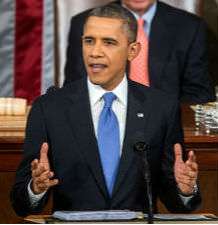Obama Says 'Stand Your Ground' Laws Encourage Violence

In remarks at the White House today, President Obama joined Attorney General Eric Holder in suggesting that eliminating the duty to retreat for people attacked outside their homes encourages unnecessary violence:
I think it would be useful for us to examine some state and local laws to see…if they are designed in such a way that they may encourage the kinds of altercations and confrontations and tragedies that we saw in the Florida case, rather than diffuse potential altercations.
I know that there's been commentary about the fact that the "stand your ground" laws in Florida were not used as a defense in the case. On the other hand, if we're sending a message as a society in our communities that someone who is armed potentially has the right to use those firearms even if there's a way for them to exit from a situation, is that really going to be contributing to the kind of peace and security and order that we'd like to see?
Obama's argument seems to be that Florida's "stand your ground" law, even if it had nothing to do with George Zimmerman's defense or acquittal, fostered a mind-set that led to his deadly confrontation with Martin. It is impossible to say for sure whether changing the rules for self-defense somehow emboldened Zimmerman to follow Martin or to get out of his car that night, but the idea does not seem very plausible to me. Was Zimmerman sitting in his car, weighing the pros and cons of getting out, when it occurred to him that should he happen to suffer a life-threatening assault at the hands of the "suspicious" character he had spotted, he would be more likely to get away with shooting him dead than he would have been before Florida's self-defense law was amended in 2005? Probably not. If his mind got as far as the possibility of a life-threatening assault, I suspect he would have stayed in his car.
As for the question of whether the mentality allegedly encouraged by the "stand your ground" law led to an unjustified use of force, we got a pretty clear answer from the jury, which not only concluded that the government had failed to prove its case beyond a reasonable doubt but seems to have accepted Zimmerman's argument that he reasonably feared for his life at the moment he fired his gun. Although Obama apparently disagrees with that judgment, he sees nothing wrong with the process that produced it:
The judge conducted the trial in a professional manner. The prosecution and the defense made their arguments. The juries were properly instructed that in a case such as this reasonable doubt was relevant, and they rendered a verdict. And once the jury has spoken, that's how our system works.
That respect-the-verdict message seems inconsistent with prosecuting Zimmerman again for the same shooting, as the Justice Department is considering. But Obama seemed to tamp down expectations of federal charges:
I know that Eric Holder is reviewing what happened down there, but I think it's important for people to have some clear expectations here. Traditionally, these are issues of state and local government, the criminal code. And law enforcement is traditionally done at the state and local levels, not at the federal levels.
The same could be said of the rules for self-defense, of course, but that does not stop Obama from weighing in on how state legislators should write them:
For those who resist that idea that we should think about something like these "stand your ground" laws, I'd just ask people to consider, if Trayvon Martin was of age and armed, could he have stood his ground on that sidewalk? And do we actually think that he would have been justified in shooting Mr. Zimmerman who had followed him in a car because he felt threatened? And if the answer to that question is at least ambiguous, then it seems to me that we might want to examine those kinds of laws.
Martin would not have been justified in shooting Zimmerman simply because Zimmerman had followed him. But if Zimmerman had attacked him, Martin would have had a right to "meet force with force," including deadly force if he reasonably thought his life was in danger, which is not the same as merely feeling threatened. Why does Obama think this is a hard question?


Show Comments (79)